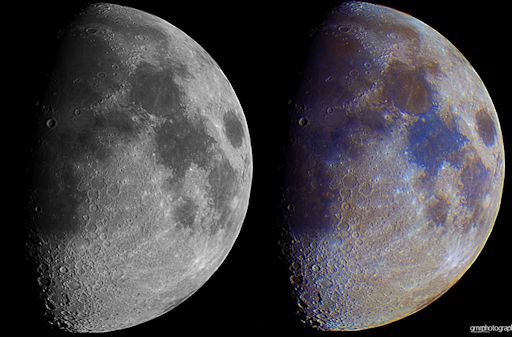Will the Moon really turn blue? When someone says "Once in a Blue Moon," you know what they mean: rare, seldom, even absurd. This year it means "the end of July." For the second time this month, the Moon is about to become full. There was one full Moon on July 2nd, and now another is coming on July 31st. According to modern folklore, the second full Moon in a calendar month is "blue." Strange but true: Sometimes the Moon really turns blue. Scroll past the waxing full Moon, photographed on July 25th by Giuseppe Petricca of Pisa, Italy, for more information:

The blue areas in the color-enhanced image (right) are caused by titanium in lunar soil. [more]
A truly-blue Moon usually requires a volcanic eruption. Back in 1883, for example, people saw blue moons almost every night after the Indonesian volcano Krakatoa exploded with the force of a 100-megaton nuclear bomb. Plumes of ash rose to the very top of Earth's atmosphere, and the Moon became an azure-colored disk.
Krakatoa's ash was the reason. Some of the plumes were filled with particles 1 micron wide, about the same as the wavelength of red light. Particles of this special size strongly scatter red light, while allowing blue light to pass through. Krakatoa's clouds thus acted like a blue filter. People also saw blue-colored Moons in 1983 after the eruption of the El Chichon volcano in Mexico. And there are reports of blue Moons caused by Mt. St. Helens in 1980 and Mount Pinatubo in 1991.
Forest fires can do the same trick. A famous example is the giant muskeg fire of Sept. 1953 in Alberta, Canada. Clouds of smoke containing micron-sized oil droplets produced lavender suns and blue Moons all the way from North America to England. At this time of year, summer wildfires often produce smoke with an abundance of micron-sized particles–just the right size to turn the Moon truly blue. Sky watchers in western parts of the USA and Canada, where wildfires are in progress, could experience this phenomenon. - SpaceWeather
